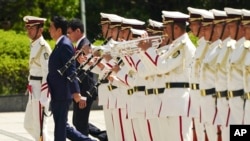올해 일본의 방위백서에서 북한의 위협이 중국의 군사적 대두에 관한 설명보다 아래에 기술된 가운데, 미국의 동아시아 전문가들은 일본은 여전히 북한을 큰 위협으로 인식하고 있다고 지적했습니다. 일본이 트럼프 행정부와 문재인 정부의 대북 접근법 사이에서 갈등하고 있다고 지적했습니다. 조상진 기자가 보도합니다.
일본은 중국을 최대위협으로 지목한 새 방위백서 내용에도 불구하고 여전히 북한을 위험시하고 있다고 스콧 스나이더 미국 외교협회 미한정책국장이 지적했습니다.
[녹취 : 스콧 스나이더 국장] “Japan has very concerned about the North Korean threats. They feel that it continues to be a threat we've seen, Prime Minister Abe directly contradict President Trump regarding the significance of short range missiles on several occasions over the course of the past few months.
스나이더 국장은 27일 VOA와의 인터뷰에서 아베 신조 일본 총리가 북한의 단거리 미사일 발사에 대해 트럼프 대통령과 종종 이견을 보였다며, 북한의 위협에 대한 일본의 우려는 전혀 줄어들지 않았다고 말했습니다.
지난해 일본의 방위백서는 각국의 방위정책을 기술할 때 미국을 가장 먼저 소개하고 이후에 북한을 중심으로 한반도 상황을 다뤘지만, 올해에는 미국, 중국, 북한 순이었습니다.
일본 방위성 관계자는 기술 순서가 중요성을 나타내는 것은 아니라고 해명했지만, 일본 언론에서는 중요도를 낮춘 것이 아니냐는 지적이 나왔습니다.
스나이더 국장은 이번 방위백서에 북한 핵무기의 소형화와 탄두화 등이 실현됐을 가능성이 언급된 것을 지적하며 일본 정부의 위기감은 변화가 없다고 말했습니다.
아울러 북한에 대한 트럼프 대통령의 태도도 일본을 불안하게 만드는 이유 중 하나로 꼽았습니다. 트럼프 대통령이 북한의 단거리 미사일을 용인하는 듯한 발언을 하고 북한과 김정은 위원장을 칭찬하는 발언을 하는 데 대해 일본이 민감한 반응을 보이고 있다는 겁니다.
[녹취 : 스콧 스나이더 국장] “I think the Japanese very anxious about some of President Trump's statements. I think that's one reason why the governments of the United States and Japan, Trump and Abe administration's just cut a deal on economic cooperation. The Japanese government was not enthusiastic about signing a bilateral trade deal with the United States. I think the Prime Minister Abe felt that in view of Japan's close relationship with the United States that it would be better for Japan if he went ahead and did that, even though he I think would have preferred that the United States, stayed involved with the TPP.”
대니얼 스나이더 스탠포드 대학 연구원 역시 일본의 북한 위협 체감도가 남다르다는 점을 지적했습니다.
[녹취 : 대니얼 스나이더 부소장] “So, I mean, It's not an either or question either China or North Korea. It's, you know, I think both are the principal security concerns for the Japanese.”
장기 전략상 중국이 동아시아에서 일본에 더 큰 위협인 것은 사실이지만 중국과 북한 중 누가 더 큰 위협인지 선택하는 문제는 아니라는 겁니다.
스나이더 연구원은 트럼프 행정부가 북한에 어떤 조치를 취할지에 대해 일본이 상당히 긴장하고 있다고 말했습니다.
[녹취 : 대니얼 스나이더 부소장] “I think Japanese are quite nervous about what the Trump administration may do with North Korea. And I think Abe was very clear in saying that he did not see the recent tests by North Korea with short range ballistic missiles as being a subject that they could ignore. They see it as a violation of the UN Security Council resolutions. And clearly, it's a very much these weapons put Japan itself at risk. So they're always worried that the United States under Trump could reach a deal where we would settle for halting North Korea's long range missile program capping to some degree their nuclear weapons at a certain level in exchange for lifting sanctions and so on.”
미국과의 엇박자 논란을 감수하면서까지 북한의 단거리 탄도미사일을 무시할 수 없음을 분명히 한 것은 이런 일본의 시각을 보여준다는 설명입니다.
그러면서 북한의 이런 무기를 유엔 안보리 결의 위반이자 위협으로 보는 일본은 트럼프 행정부가 북한과 핵무기와 장거리 미사일 프로그램을 동결하는 선에서 제재 해제를 합의하지 않을까 우려한다고 말했습니다.
프랭크 자누지 맨스필드재단 회장은 아베 총리가 북핵 위협과는 별개로 북한에 대화를 제안하는 것은 북한과의 대화를 원하는 트럼프 대통령을 의식한 행동이라고 진단했습니다. 북한과 무엇이 가능할지 보려는 동맹국 미국과 보조를 맞추기 위해서라는 분석입니다.
[녹취 : 자누지 회장] “This offer of dialogue is more linked in my view to President Trump. And the fact that we have a US president who is eager to resume dialogue with North Korea. And Japan feels that as a close US treaty ally, that they should make a parallel effort to see what is possible with North Korea.”
전문가들은 특히 일본이 비슷한 방향으로 가고 있는 한국의 대북 접근법과 트럼프 행정부의 미-북 정상외교 사이에서 딜레마에 처했다고 분석했습니다.
[녹취 : 스콧 스나이더 국장] “I think the government of Japan is expressing extreme doubt about the moon administration's approach to North Korea. But President Trump is also pursuing engagement toward North Korea. So it puts Prime Minister Ave into a little bit of a difficult situation because he has publicly endorsed President Trump's engagement with Kim Jong Un.”
스콧 스나이더 국장은 일본은 한국 문재인 정부의 대북 관여 정책에 극도의 의구심을 가지면서도 트럼프 대통령과 김정은과의 직접 접촉에 대해선 공개적으로 지지 입장을 밝히는 등 어려운 상태에 놓였다고 말했습니다.
대니얼 스나이더 연구원은 트럼프 행정부가 북한의 미사일 위협을 축소하고 동맹을 경시하는 태도를 밀고 나가면 자칫 일본의 핵무장을 부추길 수도 있다고 내다봤습니다.
[녹취 : 대니얼 스나이더 연구원] “I think prospect that worries a lot of people inside Japan and people outside Japan, because ultimately if they can't rely on the security guarantees for the United States of the extended deterrence that they have to think about their own forms of deterrence. And ultimately, of course, that means they have to think about whether they needed their own nuclear weapons.”
스나이더 연구원은 미국의 확장억지력에 국가 안보를 더 이상 맡길 수 없다고 느낄 경우 일본은 자체 억지력 확보 차원에서 핵무기 보유를 고려하지 않을 수 없을 것이라고 말했습니다.
VOA 뉴스 조상진 입니다.
| 독자 제보: VOA는 독자 여러분의 제보를 기다리고 있습니다. 기사화를 원하는 내용을 연락처와 함께 Koreanewsdesk@voanews.com 이메일로 보내주시면 뉴스 제작에 적극적으로 반영하겠습니다. 제공하신 정보는 취재를 위해서만 사용되며, 제보자의 신분은 철저히 보호됩니다 |








